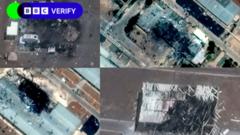The ongoing military conflict between Israel and Iran entered a perilous phase, with Israel launching extensive airstrikes targeting key Iranian installations, including nuclear facilities and the oil infrastructure. The strikes have triggered retaliatory missile attacks from Iran, with significant civilian casualties reported on both sides. As international calls for de-escalation go unheeded, the prospect of a larger regional conflict looms ever greater.
Escalation of Conflict: Israel's Intensifying Strikes on Iran Ignite Tensions

Escalation of Conflict: Israel's Intensifying Strikes on Iran Ignite Tensions
A detailed overview of the escalating military conflict between Israel and Iran as renewed airstrikes ignite fears of wider warfare.
June 14, 2025, 6:30 p.m. ET; the ongoing conflict between Israel and Iran reached a new level of escalation as Israel conducted extensive airstrikes against Iranian nuclear and military sites. Israeli warplanes targeted several locations in Tehran, including experimental laboratories used for its controversial nuclear program, as Israeli defense officials confirmed. In a stark demonstration of their resolve, Israeli forces also struck the Shahran oil refinery, igniting massive fires, as reported by various local and international news agencies.
Eyewitness accounts from Tehran described flames visible for miles and the chaotic aftermath of explosions at fuel depots. An Iranian official confirmed that the Shahran fuel and gasoline depot suffered severe damage, triggering explosions that raised alarms for residential neighborhoods nearby. Residents experienced what was described as an earthquake-like force from the blasts, showcasing the scale of destruction across the city.
In response, Iranian missile barrages targeted Israeli cities, notably sending projectiles towards the northern coastal city of Haifa and the capital, Jerusalem. An Israeli military spokesperson confirmed that a substantial number of missiles, over 200, were fired from Iran, as both sides exchanged fire with unprecedented intensity. Reports indicate that Iranian strikes resulted in civilian casualties, with at least one confirmed fatality in Israel as missile fragments fell on residential areas.
Israeli officials maintain that targeting Iranian oil infrastructure is a necessary measure to deter further missile strikes, while escalating both sides' military capabilities and the stakes of an already volatile conflict. The Israeli defense minister warned the Iranian leadership of dire consequences for continued assaults on Israeli civilians, indicating a preparedness to escalate attacks.
The conflict drew reactions from various international leaders, with some nations expressing alarm at the potential for regional destabilization. Calls for de-escalation multiplied, but both Israel and Iran seemed determined to proceed with military actions despite global appeals. Observers worry that further attacks on civilian infrastructure could lead to wider repercussions for both nations and surrounding countries economically reliant on stability in the region.
As airstrikes force civilians in both Israel and Iran to scramble for safety, the immediate humanitarian impacts are severe, raising concerns about the potential for drawn-out warfare. With continued exchanges of fire, both parties stand firm on their positions, and the prospect of extended conflict looms ominously on the horizon. Concerns over worsening humanitarian conditions for ordinary citizens are increasingly paramount as discussions about peace seem to fade in the wake of persistent violence.
Eyewitness accounts from Tehran described flames visible for miles and the chaotic aftermath of explosions at fuel depots. An Iranian official confirmed that the Shahran fuel and gasoline depot suffered severe damage, triggering explosions that raised alarms for residential neighborhoods nearby. Residents experienced what was described as an earthquake-like force from the blasts, showcasing the scale of destruction across the city.
In response, Iranian missile barrages targeted Israeli cities, notably sending projectiles towards the northern coastal city of Haifa and the capital, Jerusalem. An Israeli military spokesperson confirmed that a substantial number of missiles, over 200, were fired from Iran, as both sides exchanged fire with unprecedented intensity. Reports indicate that Iranian strikes resulted in civilian casualties, with at least one confirmed fatality in Israel as missile fragments fell on residential areas.
Israeli officials maintain that targeting Iranian oil infrastructure is a necessary measure to deter further missile strikes, while escalating both sides' military capabilities and the stakes of an already volatile conflict. The Israeli defense minister warned the Iranian leadership of dire consequences for continued assaults on Israeli civilians, indicating a preparedness to escalate attacks.
The conflict drew reactions from various international leaders, with some nations expressing alarm at the potential for regional destabilization. Calls for de-escalation multiplied, but both Israel and Iran seemed determined to proceed with military actions despite global appeals. Observers worry that further attacks on civilian infrastructure could lead to wider repercussions for both nations and surrounding countries economically reliant on stability in the region.
As airstrikes force civilians in both Israel and Iran to scramble for safety, the immediate humanitarian impacts are severe, raising concerns about the potential for drawn-out warfare. With continued exchanges of fire, both parties stand firm on their positions, and the prospect of extended conflict looms ominously on the horizon. Concerns over worsening humanitarian conditions for ordinary citizens are increasingly paramount as discussions about peace seem to fade in the wake of persistent violence.





















